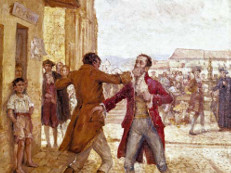INDEPENDENCE NARRATIVES: PAST AND PRESENT
The first chapter of this textbook lays out a very important message that I did not completely realize before reading. That is that Latin American independence was not gained all at once but created in a long standing process, each region having its own struggle and solutions.
Having grown up in the United States, I learned about the American revolution much like Dawson describes with the “Shot Heard Round the World.” It has always given me an image of a unified front, a common history. Yet as brought up in the text, this was only freedoms for a small percent of the population which was over represented.
I really agree with what Michel-Rolph Trouillot says about history, that it is “not what happened, but is what is said about what happened.” It’s important that we don’t over simplify the history of Latin America, and that it is not told through only a small percentage of sources.
That said, the sources reviewed in this chapter, Simon Bolivar, Jose Marti, and Hugo Chavez, were from different backgrounds and time periods, but all shared a very common goal.
Simon Bolivar claimed Latin America to be stuck in “permanent infancy” due to a lack of legislation. He explains that this is because the citizens of Latin America have been enslaved into blindly following the rules and regulations of their Spanish conquerers, unable to put their own ideas and values into practice. I think that Bolivar is right in that Latin Americans have been forced into following so many other people’s rules, that they do not know where to begin in creating their own.
Jose Marti follows up this idea with stating that governing is an “art” that is learned through education. I think he brings up a strong point in explaining that a European education must fall second to American. That citizens must learn every detail of their own history and culture, instead of being washed out by facts about ancient Europe. This way, America can claim its own identity, and unite as a more common force. I agree with him in that people should put aside their small mindset and trivial issues in order to join hands and see the big picture.
Hugo Chavez discusses the “abyss” that begins to form between the North and the South, a more modern freedom that South America must fight for. I thought it was powerful how he began his speech with all of the universally great aspects of South America such as the beautiful, rich land. He seems to have done this to form a common ground and positive hope for listeners. I agree that Neo-liberalism has been the cause for broken economic promises. Innovation brings wealth to a very small percentage of the population, and the rest are under represented and part of a widespread, fast-growing poverty. He also references the importance of education, and the lack of education that citizens of South America have access to. He ends his speech with an idea that reminds me of what Trouillot says about history and sources. He essentially asks, “what if South America was the voice of the news?”
What if South America was given the chance to write its own history, and see it for what it really is? What if what is said about what happened is closer to what actually happened?
I think that all three leaders referenced in this chapter would hope for this, and the only way for this to become possible is for South American citizens to form a strong, unified front.

